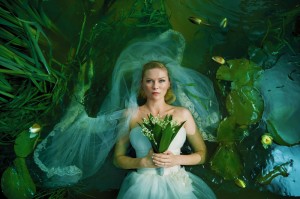
Besides having an intergalactic theme, “Melancholia” offers a revealing yet dark, comedic look at relationships within a family structure.
Directed by Lars von Trier, “Melancholia” stars Kirsten Dunst as Justine, Charlotte Gainsbough as Claire and Kiefer Sutherland as John. The plot of the film revolves around news that a planet called Melancholia was discovered behind the sun and is threatening to crash into Earth.
One of the many unique features that von Trier presents to the audience is the introduction. The film begins with a summary of the entire movie in images set to Richard Wagner’s prelude to “Tristan und Isolde.” With the addition of a powerful musical introduction, the images tell the ending of the film before the entire story is played out.
At first glance the film boasts two separate storylines that could be split into different movies, but von Trier does an excellent job weaving the plots together seamlessly. Part 1, titled “Justine,” begins with Justine’swedding reception to Michael (Alexander Skarsgard). Here, the audience quickly notices that there is something troubling Justine’s seemingly perfect life. She randomly leaves the party, wanders off by herself and becomes intimate with another man outside the reception venue — all the while leaving her husband to fend for himself. The audience sees Justine ruining her marriage and career all in one evening.
The second part, titled “Claire,” is where the audience gets a more in-depth look at Claire (Justine’s sister) and the planet Melancholia becomes the focus of the film. At this point, Justine has become severely depressed and goes to live with her sister and brother-in-law. The title “Melancholia” gains a deeper meaning then just a name of the rogue planet. Melancholia is defined as a mental condition characterized by extreme depression, bodily complaints, and often hallucinations and delusions. The audience sees how disabling Justine’s depression is when Claire tries to help Justine bathe and fails.
While Claire is extremely fearful that Melancholia will strike Earth, her husband, John, tries to convince his wife that it will just “fly by,” even though the planet is visible in the sky. One poignant scene occurs when the moon is on the left side of the screen, Justine is standing on a balcony in the middle, and on the right is Melancholia. The rest of the film shows the sisters struggling to deal with each other and the impending doom that Melancholia brings.
Premiering May 18 at Cannes Film Festival, this movie is no stranger to controversy. At a press conference for the film, von Trier made a statement in which the press deemed him to be a Nazi sympathizer in regard to comments he made about Hitler and kidding about being a Nazi. The board of directors at Cannes gave von Trier the rare title of persona non grata, which is Latin for “an unwelcome person.”
While von Trier has since apologized for his comments, audiences should not let the director’s reputation this issue deter them from seeing his finished work.
The only comment I had about the film was its length. Running two hours and 10 minutes, the film is almost on par with “Titanic,” but the beautiful imagery and elaborate music more than make up for that.
I’ve always believed the notion that a movie is good if it affects you hours or days after you’ve seen it. While the plot of this movie may sound outrageous or ridiculous, von Trier does an excellent job of making you feel like the world he’s portraying is realistic, and he is a master at capturing the real emotions which could result from impending doom.

